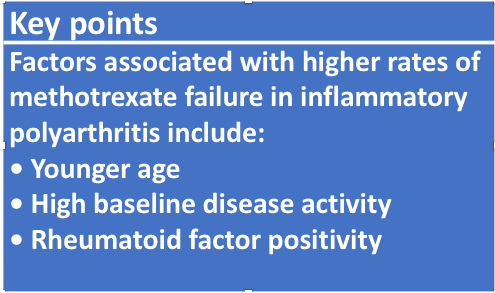Article
Predictors of Methotrexate Failure in Inflammatory Polyarthritis
RF positive, young with high disease activity . . . a big negative for MTX success.
Key points for your practice

Methotrexate (MTX) remains the first-line therapy for rheumatoid arthritis (RA). It is imperative that treatment be started early and be effective in order to prevent irreversible joint damage.
James Bluett and fellow researchers in the UK suggest that knowing in advance who may fail MTX therapy may allow clinicians to predict failure and treat patients at risk with a combination disease modifying anti-rheumatic drug regimen.1
Previous studies have shown that female gender, smoking, longer disease activity, and shared epitope positivity are linked to MTX failure. Since these studies were published, the use of MTX has increased significantly.
The authors sought to investigate the time to MTX cessation in patients with inflammatory polyarthritis as well as to examine reasons for stopping MTX while determining which risk factors predict MTX failure. Recently, they published their findings in Arthritis Research & Therapy.
The study
The authors conducted a prospective cohort study that included 431 patients from the Norfolk Arthritis Register with early inflammatory polyarthritis. The primary outcome measure was MTX failure due to adverse events or inefficacy.
The results
• There were 67 (16%) MTX failures due to adverse events and 143 (33%) due to inefficacy.
• The most frequent adverse event was gastrointestinal symptoms, reported by 28 subjects (42%).
• The likelihood that patients would remain on MTX at 2 and 5 years was 82% (95% confidence interval [CI]: 0.79-0.86) and 72% (95% CI: 0.67-0.76), respectively.
• Younger age (subdistribution hazard ratio [sHR] = 0.97; 95% CI: 0.96-0.99), rheumatoid factor (RF) positivity (sHR = 1.67; 95% CI: 1.13-2.48), and higher baseline disease activity score-28 (C-reactive protein) (sHR = 1.23; 95% CI: 1.05-1.43) were associated with early MTX failure due to inefficacy.
• RF positivity was protective against early MTX failure due to adverse events.
Implications for clinicians
• Be vigilant for younger RA patients with high disease activity and RF positivity, as they are at higher risk for MTX treatment failure.
• A “treat to target” strategy should include early combination therapy in patients at high risk for MTX monotherapy failure.
• Perform ongoing blood monitoring for patients who are receiving MTX in an effort to detect markers of treatment failure.
Disclosures:
The Medical Research Council, GlaxoSmithKline, AstraZeneca, the Medical Evaluation Unit, and Arthritis Research UK provided funding for this study.
References:
1. Bluett J, Sergeant JC, MacGregor AJ, et al. Risk factors for oral methotrexate failure in patients with inflammatory polyarthritis: results from a UK prospective cohort study. Arthritis Res Ther. 2018;20:50. doi.org/10.1186/s13075-018-1544-9.




